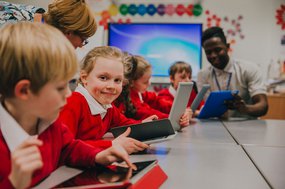
This series of fake news and critical literacy resources have been created in response to the findings and recommendations from the Commission on Fake News and the Teaching of Critical Literacy Skills in Schools.
These resources are designed to help primary and secondary teachers, parents and school librarians equip children with the critical literacy skills they need to survive and thrive in today's digital world.
The resources include:
Parents
- Top tips guide to help start conversations about fake news with children
Primary
- Primary teaching resource which includes practical lesson ideas, critical questions and a directory of useful organisations and further resources
- Primary discussion cards to help students think more critically about the texts they read in lessons
- Primary poster for displaying in the classroom
Secondary
- Secondary teaching resource which includes practical lesson ideas, critical questions and a directory of useful organisations and further resources
- Secondary discussion cards to help students think more critically about the texts they read in lessons, which can be used in all subjects and with all text types
- Secondary poster for displaying in the classroom
- Subject-specific case studies and lesson plans for: citizenship, drama, economics, English, history, PSHE, maths, school libraries, science and sociology